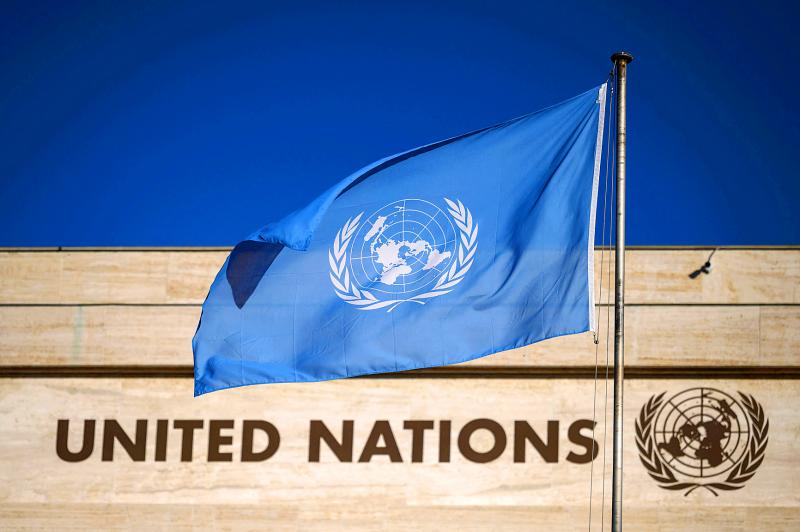The Ministry of Foreign Affairs (MOFA) yesterday urged the UN not to yield to China, stressing that UN Resolution 2758 does not say that the People’s Republic of China (PRC) can represent Taiwan.
The ministry issued the remarks as Monday next week marks the 50th anniversary of the resolution, which gave the Repulic of China’s seat in the UN to the PRC.
In the resolution adopted on Oct. 25, 1971, the UN General Assembly decided to “expel forthwith the representatives of Chiang Kai-shek (蔣介石) from the place which they unlawfully occupy at the United Nations and in all the organizations related to it.”

Photo: AFP
Since then, Taiwan has not been represented at the UN.
The ministry yesterday reiterated that the resolution only deals with the issue of China’s representation in the UN system.
It does not say that Taiwan is part of the PRC, nor does it authorize the PRC to represent the people of Taiwan, the ministry said.
Ministry spokeswoman Joanne Ou (歐江安) said it is regretful that the UN Secretariat has persisted in making incorrect references to the resolution and in expanding a false interpretation that backs Beijing’s assertion that “Taiwan is a province of China.”
Meanwhile, it refuses to allow Taiwanese to enter UN facilities, denies Taiwan the opportunity to engage in UN forums and even rejects applications from Taiwanese media to cover events inside the UN, she said.
The PRC has never governed Taiwan, and does not have the right to represent the people of Taiwan, Ou added.
The ministry urged the UN not bow to China’s political pressure, and not to expand the interpretation of Resolution 2758, which has excluded Taiwan for too long.

MAKING WAVES: China’s maritime militia could become a nontraditional threat in war, clogging up shipping lanes to prevent US or Japanese intervention, a report said About 1,900 Chinese ships flying flags of convenience and fishing vessels that participated in China’s military exercises around Taiwan last month and in January last year have been listed for monitoring, Coast Guard Administration (CGA) Deputy Director-General Hsieh Ching-chin (謝慶欽) said yesterday. Following amendments to the Commercial Port Act (商港法) and the Law of Ships (船舶法) last month, the CGA can designate possible berthing areas or deny ports of call for vessels suspected of loitering around areas where undersea cables can be accessed, Oceans Affairs Council Minister Kuan Bi-ling (管碧玲) said. The list of suspected ships, originally 300, had risen to about

DAREDEVIL: Honnold said it had always been a dream of his to climb Taipei 101, while a Netflix producer said the skyscraper was ‘a real icon of this country’ US climber Alex Honnold yesterday took on Taiwan’s tallest building, becoming the first person to scale Taipei 101 without a rope, harness or safety net. Hundreds of spectators gathered at the base of the 101-story skyscraper to watch Honnold, 40, embark on his daredevil feat, which was also broadcast live on Netflix. Dressed in a red T-shirt and yellow custom-made climbing shoes, Honnold swiftly moved up the southeast face of the glass and steel building. At one point, he stepped onto a platform midway up to wave down at fans and onlookers who were taking photos. People watching from inside

Japan’s strategic alliance with the US would collapse if Tokyo were to turn away from a conflict in Taiwan, Japanese Prime Minister Sanae Takaichi said yesterday, but distanced herself from previous comments that suggested a possible military response in such an event. Takaichi expressed her latest views on a nationally broadcast TV program late on Monday, where an opposition party leader criticized her for igniting tensions with China with the earlier remarks. Ties between Japan and China have sunk to the worst level in years after Takaichi said in November that a hypothetical Chinese attack on Taiwan could bring about a Japanese

The WHO ignored early COVID-19 warnings from Taiwan, US Deputy Secretary of Health and Human Services Jim O’Neill said on Friday, as part of justification for Washington withdrawing from the global health body. US Secretary of State Marco Rubio on Thursday said that the US was pulling out of the UN agency, as it failed to fulfill its responsibilities during the COVID-19 pandemic. The WHO “ignored early COVID warnings from Taiwan in 2019 by pretending Taiwan did not exist, O’Neill wrote on X on Friday, Taiwan time. “It ignored rigorous science and promoted lockdowns.” The US will “continue international coordination on infectious